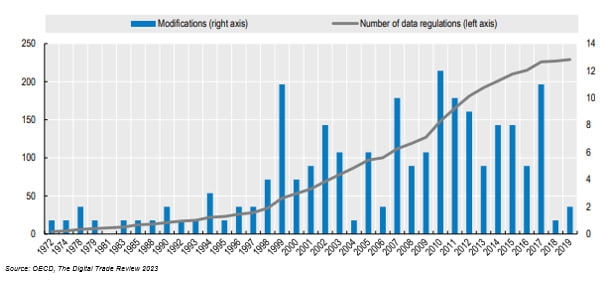Globally, the number of changes in tariff duties, custom duties, and VAT regulations over the past years is quite substantial. These changes, driven by geopolitical shifts, technological progress, and economic factors, add layers of complexity to the already intricate world of international tax & trade. The situation can be likened to a sailor at sea without a clear destination, where no wind is favourable without a set direction. Data is the beacon that provides this direction, aiding businesses in steering through the constant flux of business complexity. In this article we will shed light on how businesses can get started on leveraging data for global trade.
This article was written by Mourad Seghir ([email protected]) and Sascha Sieffers ([email protected]), who are part of RSM Netherlands Business Consulting services with a focus on Sustainability and Supply Chain management.
One of the major challenges in global trade and supply chain management is the lack of real-time visibility into data. Many organizations struggle to gather, analyse, contextualise & understand up-to-date information. For international supply chains, effective data management is crucial. This leads to delays, inefficiencies, and increased costs. As businesses grow globally, they are confronted with data from diverse sources, complicating the task of managing this information. The volume of data generated by global companies is immense, encompassing everything from production details to customer feedback. While this can be overwhelming, it also presents an opportunity to gain valuable insights into market trends and consumer behaviour, aiding in more informed decision-making.
However, the challenge lies in managing this data efficiently. Proper categorization, processing, and ensuring accuracy are essential to prevent data from becoming a hindrance. Businesses must invest in skilled teams and leverage the right tools and technologies to enhance data management practices, improving accuracy and operational efficiency.
How to overcome this challenge
To overcome the challenge of managing vast amounts of data in global trade, especially in the international context, businesses need to focus on several key strategies which we have illustrated below.

To bridge these strategies to actionable results, the final and crucial piece is integrating business logic to contextualize the data specific to your enterprise's needs.
The role of business logic
Business logic is the foundation of the data analysis process, providing a structured approach to turning raw data into actionable insights. It defines how data is organized, processed, and analysed, ensuring efficiency, accuracy, and consistency. Business logic is crucial for decision-making, helping identify patterns and trends that inform strategic choices. It also serves as a quality control mechanism, validating data and ensuring its reliability for analysis.
Customization of business logic allows organizations to tailor data analysis to their specific needs, aligning with industry dynamics and strategic goals. This adaptability ensures that data analysis efforts are relevant and impactful, driving business growth and success.
Forward Thinking
Data are the foundation of informed decision making. While data may seem like a solution, we should revisit the initial metaphor of the shipper at sea, business logic needs to be implemented to have direction. Tailoring data to business needs and establishing a data infrastructure are crucial starting points. This requires fostering a new culture within the organization, emphasizing the critical role of strategic planning.
Bear in mind, as data becomes more prominent, the risk of cyber threats and data breaches becomes more significant. Ensuring the security and privacy of (supply chain) data is vital for maintaining trust and preventing disruptions. A growing challenge is ensuring that, when data is used for international processes, it receives the desired degree of oversight and protection. This combination of enabling cross-border data and ensuring that these take place in the context of trusted relationships has come to be known as data free flows with trust.

Strong cybersecurity practices like encryption, controlled access, and regular security checks are crucial. Moreover, organizing your data not only aids in compliance with EU regulations like General Data Protection Regulation (GDPR), Corporate Sustainability Reporting Directive (CSRD) and the Network Information Security Directive 2 (NIS2) but also simplifies business interactions. A well-structured data system makes sharing information with stakeholders' smoother, enhancing your appeal to potential partners by making business transactions more straightforward and secure.
RSM is thought leader in the field of supply chain and international trade consulting. We offer frequent insights through training and sharing of thought leadership that is based on a detailed knowledge of regulatory obligations and practical applications in working with our customers. If you want to know more, please reach out to one of our consultants.

